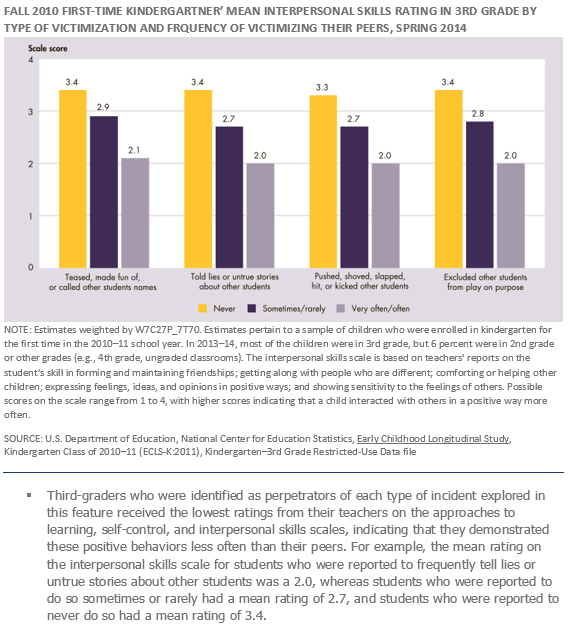In an earlier blog post, we shared that one of our survey programs—the Early Childhood Longitudinal Study (ECLS) program—was collecting data on socioemotional development to better understand how different academic and nonacademic factors may influence a child’s early schooling experiences. New data are now available from the spring 2016 public-use dataset for the Early Childhood Longitudinal Study, Kindergarten Class of 2010–11 (ECLS-K:2011). This file contains data from every round of the ECLS-K:2011, from kindergarten through fifth grade.
For decades, the National Center for Education Statistics and other researchers have used ECLS data to examine questions about elementary school students’ socioemotional development. For instance, as seen in the excerpt below, an earlier wave of data was used to develop an indicator in the America’s Children report that looks at first-time kindergartners’ scores on socioemotional scales and how these students may victimize their peers. ECLS data are rich with information that can be used to analyze the influence of family, school, community, and individual factors on students’ development, early learning, and performance in school.
In the most recent ECLS program study, the ECLS-K:2011 collected information on its sample of kindergartners during the 2010–11 school year and then at least once during every academic year thereafter until 2015–16, when most of the students were in fifth grade. The ECLS-K:2011 data allow researchers to study how students’ socioemotional skills develop over time through reports from the students themselves and from key people in those students’ lives, including their parents, before- and after-school care providers, teachers, and school administrators.
Here’s a peek into the socioemotional development measures included the ECLS-K:2011:
- Students completed questionnaires about their relationships with peers, social distress, peer victimization, and satisfaction with different aspects of their lives.
- Teachers used their experiences with students in their classrooms to provide information about students’ approaches to learning (e.g., eagerness to learn, self-direction, attentiveness), social skills, and problem behaviors, as well as their own closeness and conflict with students.
- Parents provided separate reports on much of the same information reported by teachers to provide a richer picture of their child’s development through a different lens.
For more information on the measures of socioemotional development included in the ECLS-K:2011, please see our study instruments or email the ECLS study team. Also, keep an eye out for future online training modules for the ECLS-K:2011, which will be released in fall 2019 or early 2020. To be alerted about the release of the free online trainings, email the ECLS study team at ECLS@ed.gov and ask to be added to the ECLS listserv.
Excerpt from America’s Children: Key National Indicators of Well-Being 2017

By Jill Carlivati McCarroll and Gail M. Mulligan
Organizing, planning, and managing time influence student achievement and become increasingly important as adolescents enter middle school. Clinical research offers promising practices for improving these skills in students with attention-deficit/hyperactivity disorder (ADHD), but the key is getting these practices into schools. That’s where IES-funded researchers come in.
In 2009, researchers from Virginia Commonwealth University used an IES grant to develop Homework, Organization, and Planning Skills (HOPS)—a program that teaches middle school students with ADHD to use checklists to organize, plan, and manage their schoolwork.

In 2013, IES funded an initial efficacy study to test HOPS in public middle schools, comparing HOPS with more traditional homework support. Researchers found that parents of students using HOPS and traditional homework support reported fewer homework problems and better organizational skills at home. In contrast, teachers reported improved organization and management skills in the classroom only for their students who used HOPS, not the homework support. HOPS also provided greater benefits overall for students with higher levels of hyperactivity and oppositional behavior and greater deficits in organizational skills.
In June, IES awarded a grant to Children’s Hospital of Philadelphia to conduct a five-year effectiveness study that will test whether HOPS is beneficial for all students who have organizational skill deficits, rather than just students with a formal ADHD diagnosis. This is important because organizational deficits affect student achievement regardless of whether a student has been diagnosed with a learning disorder. This study will determine whether schools can implement HOPS effectively and inexpensively in a school environment.
Written by Greg Shanahan, IES Presidential Management Fellow, and Emily Doolittle, NCER Team Lead for Social Behavioral Research